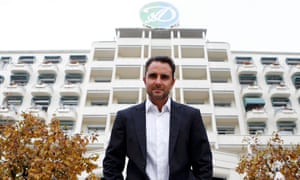Hervé Falciani sentenced in his absence for financial
espionage by federal court for exposing wrongdoing at HSBC’s private Swiss bank

Hervé Falciani
has sought refuge in France. Photograph: Denis Balibouse/Reuters
The
whistleblower who exposed wrongdoing at HSBC’s Swiss private bank has been
sentenced to five years in prison by a Swiss court.
Hervé Falciani, a former IT
worker, was convicted in his absence for the biggest leak in banking history.
He is currently living in France, where he sought refuge from Swiss justice,
and did not attend the trial.
The leak of
secret bank account details formed the basis of revelations – by the Guardian, the BBC, Le Monde and other
media outlets – which showed that HSBC’s Swiss banking arm turned a blind eye
to illegal activities of arms dealers and helped wealthy people evade taxes.
The Guardian
view on the HSBC files: a damning dossier
Editorial: The
use of Swiss accounts to dodge tax was systematic. The flaky response from the
bank and the politicians is anything but
While working on
the database of HSBC’s Swiss private bank, Falciani downloaded the details of about 130,000 holders
of secret Swiss accounts. The information was handed to
French investigators in December 2008 and then circulated to other European
governments.
It was used to
prosecute tax evaders including Arlette Ricci, the heir to France’s Nina Ricci
perfume empire, and to pursue Emilio Botín, the late chairman of Spain’s
Santander bank.
Switzerland’s
federal prosecutor had requested a record six-year term for Falciani for
aggravated industrial espionage, data theft and violation of commercial and
banking secrecy.
It was the
longest sentence ever demanded by the confederation’s public ministry in a case
of banking data theft. The trial was also the first conducted by the country’s
federal criminal court in which the accused had not been present.
The defendant’s
lawyers had demanded a reduced sentence, of between two and three years,
“compatible with the granting of a reprieve”.
Falciani himself
refused to appear in the dock, on the grounds that he would not be allowed a
fair trial. He described the process as a “parody of justice”.
Play Video
Hervé Falciani speaking in February 2014, to film-maker
Nick Francis, about why he became a whistleblower
Hired in 2004 to
create a client management database for the Swiss private bank, Falciani was
given wide-ranging access to sensitive data. One witness said he had brought his
own laptop with him, which the company had no control over. He was able to
install his own software on it. The laptop’s USB ports, into which memory
sticks are inserted, were not blocked.
From October
2006 until he was questioned by police on 22 December 2008, Falciani used his
privileged access to download data including bank account numbers, client
names, addresses and dates of birth, and sums held in accounts.
Carlo Bulletti,
for the prosecution, rejected the notion of Falciani as a whistleblower, saying
his actions, including approaches to banks in Lebanon, suggested he had wanted
to sell the stolen data.
“The whole
construct of the white knight is just a web of lies,” claimed Bulletti.
HSBC’s lawyer,
Laurent Moreillon, said that when copying the data, Falciani had given a series
of different reasons: that he wanted to “conduct a simple test”, that he was
using fictitious data, and that he wanted to test the bank’s security. But
Falciani had never alerted anyone inside the bank to security failings.
“Greedy – he was
and continues to be,” claimed Moreillon.
Falciani’s
lawyer, Marc Henzelin, pointed out that his client was on trial at a time when
Switzerland was in the process of dismantling its banking secrecy practices
with proposals for new laws that would pave the way for automatic information
exchange about offshore accounts held in Switzerland.
In fact,
Switzerland announced on 4 November that the country’s finance ministry temporarily shelved the plans for reform.
“It is not
Falciani who is being judged. It is the court. It is Switzerland,” said
Henzelin.
His client had
never denied stealing the data, and had worked openly with the French, German,
British, Spanish, Indian and Argentinian authorities.
A French
parliamentary report had found that of 2,325 French taxpayers with accounts at HSBC in Switzerland, just three had their affairs in
order. Turning to HSBC’s lawyer, Henzelin said: “What damage are you claiming?
The fact that your clients should have paid their taxes?”
As a holder of
both Italian and French nationality, Falciani cannot be extradited to
Switzerland by either of those countries and is therefore unlikely to ever
serve his sentence.
HSBC welcomed
the ruling, saying: “HSBC has always maintained that Falciani systematically
stole clients’ information in order to sell it for his own personal financial
gain. The court heard that he was not motivated by whistleblowing intentions
and that this was not a victimless crime.”
The
investigation showed that HSBC had routinely allowed clients to withdraw bricks
of cash, often in foreign currencies of little use in Switzerland; that it
aggressively marketed schemes likely to enable wealthy clients to avoid
European taxes; that it colluded with some clients to conceal undeclared
“black” accounts from their domestic tax authorities; and that it provided
accounts to international criminals, corrupt businessmen and other high-risk
individuals.
HSBC was fined £28m by the Geneva authorities this
year, after investigators concluded that “organisational deficiencies” had
allowed money laundering to take place at its Swiss subsidiary.
French
magistrates are conducting a criminal investigation into the bank, alleging
“complicity in aggravated money laundering and financial fraud”. HSBC has been
ordered to post bail of €100m (£70m).





No comments:
Post a Comment